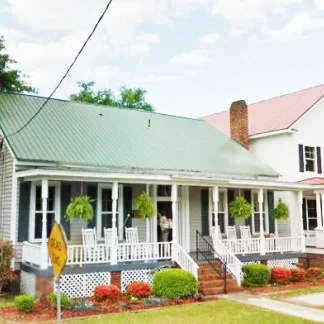Charlie Norwood VAMC
Charlie Norwood VAMC is a private rehab located in Goshen, Indiana. Charlie Norw...
The Hale Foundation is a drug and alcohol rehab located in Augusta, Georgia. They provide structured addiction treatment and a sober living environment for men aged 18 and over.
Addiction-related services provided at this facility include substance abuse treatment and sober living for men.
Residential addiction treatment Hale House provides a year-long transitional substance abuse program for men that allows individuals to take responsibility, readjust to society, and resume independent living. The program includes three phases. Phase one is establishing a foundation of recovery through the 12 steps, therapy, psychoeducation, and recreation activities. Phase 2 involves house responsibilities like participating in breakfast and dinner, daily meditation, assigned chores, AA/NA meetings, and an increased willingness to live the recovery ideals. Phase three is when an individual integrates back into society while staying sober and continuing to live their life with the principles of recovery.
Contact us for more information: (706) 722-3060

Connect with The Hale Foundation by calling their admissions team directly.
(706) 722-3060 Website Get DirectionsGroup therapy is any therapeutic work that happens in a group (not one-on-one). There are a number of different group therapy modalities, including support groups, experiential therapy, psycho-education, and more. Group therapy involves treatment as well as processing interaction between group members.
In individual therapy, a patient meets one-on-one with a trained psychologist or counselor. Therapy is a pivotal part of effective substance abuse treatment, as it often covers root causes of addiction, including challenges faced by the patient in their social, family, and work/school life.
Life skills trainings involve all the skills a person must have in order to function successfully in the world. These include time management, career guidance, money management, and effective communication. Truly successful addiction recovery is based on the ability to not only live substance-free, but to thrive. Life skills teaches the practical necessities of functioning in society, which sets clients up for success in life, and therefore sobriety.
In individual therapy, a patient meets one-on-one with a trained psychologist or counselor. Therapy is a pivotal part of effective substance abuse treatment, as it often covers root causes of addiction, including challenges faced by the patient in their social, family, and work/school life.
Life skills trainings involve all the skills a person must have in order to function successfully in the world. These include time management, career guidance, money management, and effective communication. Truly successful addiction recovery is based on the ability to not only live substance-free, but to thrive. Life skills teaches the practical necessities of functioning in society, which sets clients up for success in life, and therefore sobriety.
Life skills trainings involve all the skills a person must have in order to function successfully in the world. These include time management, career guidance, money management, and effective communication. Truly successful addiction recovery is based on the ability to not only live substance-free, but to thrive. Life skills teaches the practical necessities of functioning in society, which sets clients up for success in life, and therefore sobriety.
Charlie Norwood VAMC is a private rehab located in Goshen, Indiana. Charlie Norw...
Situated in Augusta, Georgia, Hope House is a drug and alcohol treatment center ...
Counseling Group is a private rehab located in Augusta, Georgia. Counseling Grou...
Aiken – Barnwell Mental Health Center – Hartzog Center is a public rehab located...